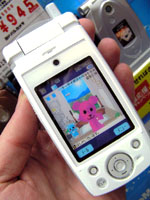Two New V603s: Killer Swivel Clamshells
 Vodafone raised the competitive bar a couple a couple notches today with the announcement of two new killer swivel clamshells phones: the V603T and V603SH (from Toshiba & Sharp; both 2G). The company said the V603SH is the first phone to feature a Motion Control Sensor that recognises and responds to movements. Jointly developed by Aichi Steel Corp. and Vodafone, the one-chip sensor allows customers to perform menu operations by moving the handset up, down, left or right. Vodafone think this will allow new possibilities with mobile gaming, such as aiming a gun by moving the handset while playing shooting games or swinging the phone like a golf club to hit a ball in golf games. Watch our video clip of the new V603SH above taken at the press event (shot with a V902SH handset); use Quick Time or Real Player to view this 3GPP video file.
Vodafone raised the competitive bar a couple a couple notches today with the announcement of two new killer swivel clamshells phones: the V603T and V603SH (from Toshiba & Sharp; both 2G). The company said the V603SH is the first phone to feature a Motion Control Sensor that recognises and responds to movements. Jointly developed by Aichi Steel Corp. and Vodafone, the one-chip sensor allows customers to perform menu operations by moving the handset up, down, left or right. Vodafone think this will allow new possibilities with mobile gaming, such as aiming a gun by moving the handset while playing shooting games or swinging the phone like a golf club to hit a ball in golf games. Watch our video clip of the new V603SH above taken at the press event (shot with a V902SH handset); use Quick Time or Real Player to view this 3GPP video file.


 In the mobile space, Asia is a huge, innovate-or-die marketplace, and MobaHo! — a joint venture of 88 Japanese and Korean companies — is gambling Big Money that Asians will want satellite TV and radio broadcasts beamed from the sky direct to their handheld receivers, cell phones and car-mounted tuners — and maybe even iPods in the future. Today, we go eye-to-eye with Mobile Broadcasting Corp. for a first-on-the-Web videocast featuring facts, analysis and great eye-candy of MobaHo’s latest digi satellite terminals.
In the mobile space, Asia is a huge, innovate-or-die marketplace, and MobaHo! — a joint venture of 88 Japanese and Korean companies — is gambling Big Money that Asians will want satellite TV and radio broadcasts beamed from the sky direct to their handheld receivers, cell phones and car-mounted tuners — and maybe even iPods in the future. Today, we go eye-to-eye with Mobile Broadcasting Corp. for a first-on-the-Web videocast featuring facts, analysis and great eye-candy of MobaHo’s latest digi satellite terminals. One of the best things about having a few days off over the holiday season in Tokyo is having time to wander casually through Akihabara and check out the latest gadgets. 2005 is shaping up as a showdown year for music-enabled portable devices and I couldn’t help but notice how DoCoMo’s new 3G handset, the SH901ic by Sharp, really does seem to have at least a slight style similarity to the iPod. As the network speed increases — and with flat-rate packet costs and improved handset technology — critical mass adoption by mainstream users buying even more data seems to be at hand. As competition increases, how will carriers, handset makers and content providers adapt their offerings over the coming year?
One of the best things about having a few days off over the holiday season in Tokyo is having time to wander casually through Akihabara and check out the latest gadgets. 2005 is shaping up as a showdown year for music-enabled portable devices and I couldn’t help but notice how DoCoMo’s new 3G handset, the SH901ic by Sharp, really does seem to have at least a slight style similarity to the iPod. As the network speed increases — and with flat-rate packet costs and improved handset technology — critical mass adoption by mainstream users buying even more data seems to be at hand. As competition increases, how will carriers, handset makers and content providers adapt their offerings over the coming year?